I am using a NUCLEO-L476RG development board, I am learning to write GPIO drivers for STM32 family I have implementing a simple logic in which I need to turn on an LED when a push button is pressed.
I have a strange issue: Edit 1:The Bread board LED turns ON when the line temp=10 is commented, it doesn't turn ON when the delay issue called. Assuming if I add any line of code into that while loop the LED does not turn ON
The Bread board LED turns ON when the delay() function is commented, it doesn't turn ON when the delay issue called.
What could be the issue?
I have powered the board using the mini usb connector on the board, and the clock is configured at MSI with 4MHz

#define delay() for(uint32_t i=0; i<=50000; i++);
int main(void)
{
GPIO_Handle_t NucleoUserLED,NucleoUserPB,BreadBoardLED,BreadBoardPB;
uint8_t inputVal,BBinpVal;
uint32_t temp;
//User green led in the nucleo board connected to PA5
NucleoUserLED.pGPIO = GPIOA;
NucleoUserLED.GPIO_Pin_Cfg.GPIO_PinNumber = GPIO_PIN_5;
NucleoUserLED.GPIO_Pin_Cfg.GPIO_PinMode = GPIO_MODE_OP;
NucleoUserLED.GPIO_Pin_Cfg.GPIO_PinPuPdControl = GPIO_IP_NO_PUPD;
NucleoUserLED.GPIO_Pin_Cfg.GPIO_PinOpType = GPIO_OP_TYPE_PP;
//User blue button in the nucleo connected to PC13
NucleoUserPB.pGPIO = GPIOC;
NucleoUserPB.GPIO_Pin_Cfg.GPIO_PinNumber = GPIO_PIN_13;
NucleoUserPB.GPIO_Pin_Cfg.GPIO_PinMode = GPIO_MODE_IP;
NucleoUserPB.GPIO_Pin_Cfg.GPIO_PinPuPdControl = GPIO_IP_NO_PUPD;
//User led in the bread board connected to PC8
BreadBoardLED.pGPIO = GPIOC;
BreadBoardLED.GPIO_Pin_Cfg.GPIO_PinNumber = GPIO_PIN_8;
BreadBoardLED.GPIO_Pin_Cfg.GPIO_PinMode = GPIO_MODE_OP;
BreadBoardLED.GPIO_Pin_Cfg.GPIO_PinPuPdControl = GPIO_IP_NO_PUPD;
BreadBoardLED.GPIO_Pin_Cfg.GPIO_PinOpType = GPIO_OP_TYPE_PP;
//User DPDT connected in the breadboard connected to PC6
BreadBoardPB.pGPIO = GPIOC;
BreadBoardPB.GPIO_Pin_Cfg.GPIO_PinNumber = GPIO_PIN_6;
BreadBoardPB.GPIO_Pin_Cfg.GPIO_PinMode = GPIO_MODE_IP;
BreadBoardPB.GPIO_Pin_Cfg.GPIO_PinPuPdControl = GPIO_IP_PU;
GPIO_PeriClkCtrl(GPIOA, ENABLE);
GPIO_PeriClkCtrl(GPIOC, ENABLE);
GPIO_Init(&NucleoUserLED);
GPIO_Init(&NucleoUserPB);
GPIO_Init(&BreadBoardLED);
GPIO_Init(&BreadBoardPB);
while(1)
{
/*****************************************************************
* Controlling the IO present in the nucleo board *
*****************************************************************/
inputVal = GPIO_ReadInputPin(NucleoUserPB.pGPIO, NucleoUserPB.GPIO_Pin_Cfg.GPIO_PinNumber);
BBinpVal = GPIO_ReadInputPin(BreadBoardPB.pGPIO, BreadBoardPB.GPIO_Pin_Cfg.GPIO_PinNumber);
if(inputVal == 0)
{
GPIO_ToggleOutputPin(NucleoUserLED.pGPIO, NucleoUserLED.GPIO_Pin_Cfg.GPIO_PinNumber);
}
/*****************************************************************
* Controlling the IO present in the bread board *
*****************************************************************/
if (BBinpVal == 0 )
{
GPIO_WriteOutputPin(BreadBoardLED.pGPIO, BreadBoardLED.GPIO_Pin_Cfg.GPIO_PinNumber, 1);
}
else
{
GPIO_WriteOutputPin(BreadBoardLED.pGPIO, BreadBoardLED.GPIO_Pin_Cfg.GPIO_PinNumber, 0);
}
delay();
}
return 0;
}